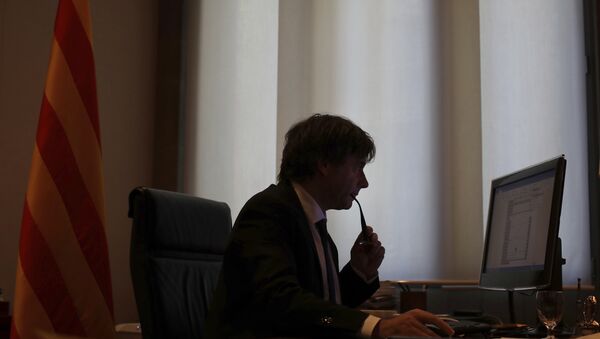Sputnik: Carles Puigdemont is now supposedly calling a snap election. How will this divide the Catalan parliament in terms of the Popular Unity Candidacy party (CUP) and the Junts pel Si movement?
Jordi Cornella: The first thing to realize is that if he calls for an election, it basically means that it's the end of his political career, and probably the end of his own party too. It will have important consequences. It is a very difficult decision for him. As for the reception of this, well, several MP's have already resigned, since it became public that an election would be called. His party is probably going to split. As for the CUP, they are of course totally against this. They have expressed that clearly. It will split the pro-independence movement quite clearly.
Many will understand that this is a logical decision. The other option is the Article 155, which would involve the suspension of Catalan Autonomy. This would be absolutely negative for Catalonia, though many of the voters will not understand that.
Sputnik: What will happen if Rajoy presses on with his application of 155?
Jordi Cornella: In principle, they have called for an election hoping that this would not happen, that it would stop the removal of Catalan autonomy. Of course, there is no guarantee. I have heard however, that there have been a lot of negotiations between the Catalan Parliament and the Central Government. They have probably already reached an agreement which is not yet public. Apparently the Basque Government has been key in reaching an agreement. They have been negotiating on behalf of both the Catalan and the Spanish government.
The Basque country is also scared that if Article 155 is applied, it will also be applied in the Basque country. It could happen because having never been applied before, nobody knows what the result would be, how long it will affect Catalonia. It could be applied again. It's like Pandora's Box.
Sputnik: Was this part of the strategy, or is this move a symptom of Spain's actions so far?
Jordi Cornella: I don't think that there's a strategy anymore. Things are changing on a daily basis. There have been loads of meetings to discuss. The only thing that is clear is that Mr Puigdemont is trying to avoid the implementation of 155, to save the autonomy of the Catalan government.
The decision could have been made a few days ago. that is perhaps why he declined to speak in front of the Senate. I don't suppose that would have helped much. There have been many examples of when other Regions in Spain have been asked to speak in front of the Senate, and the results have never been particularly important.
By calling an election now, we will have more time to negotiate. Not Puigdemont himself unfortunately. But it will happen, and it will take weeks, even months. The situation will calm down for a few weeks. But it is uncertain what will be the reaction of the public, with their protests. They have been consistently promised independence after the referendum. There could be quite a negative reaction from them.

